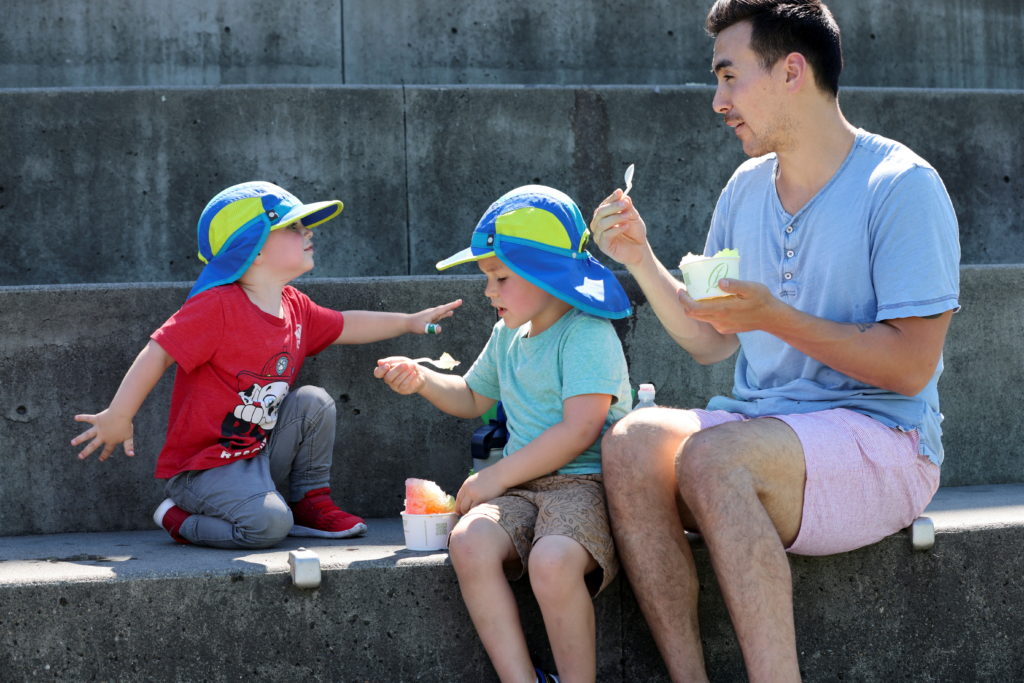PORTLAND, Ore. — Government officials, wildlife managers and utility workers across the Pacific Northwest were trying to keep people and animals safe as a historic heat wave scorched the region Saturday.
The heat was expected to break all-time records in cities and towns from eastern Washington state to Portland to southern Oregon, with temperatures in many areas expected to top out up to 30 degrees above normal. It’s a dangerous forecast for a region accustomed to mild weather, and where many people don’t have air conditioning.
The hot weather had berry farmers scrambling to pick crops before they rot on the vine and fisheries managers working to keep endangered sockeye salmon safe from too-warm river water. Stores sold out of portable air conditioners and fans, some hospitals canceled outdoor vaccination clinics, cities opened cooling centers, baseball teams canceled or moved up weekend games, and utilities braced for possible power outages.
In western Washington, morning temperatures felt warmer than they were because of a higher-than-normal dew point, the National Weather Service in Seattle wrote on Twitter. A higher dew point makes the air more muggy or uncomfortable. Seattle was expected to edge above 100 degrees Fahrenheit (38 degrees Celsius) over the weekend and in Portland, Oregon, weather forecasters said the thermometer could soar to 108 F (42 C) by Sunday, breaking an all-time record of 107 F (42 C) set in 1981. Unusually hot weather was expected to extend into next week for much of the region.
Seattle has only hit 100 F three times in recorded history, the National Weather Service said, and there was a chance it could eclipse the record of 103 F (39 C) on Monday.
“If you’re keeping a written list of the records that will fall, you might need a few pages by early next week,” NWS Seattle tweeted, as it announced that the city had already tied a record Friday for the highest morning-low temperature.
James Bryant, a Seattle resident, picked up an air conditioner in anticipation of the extreme heat. Most homes in the Northwest’s largest city don’t have air conditioning.
“My house is already hot, and so with the added heat over the next few days, I’ve got kids I got to make sure they don’t get too hot as well,” Bryant said. “It seems to be a trend … So I’m not sure what’s driving it, but it’s not fun that’s for sure.”
Columbia Basin fisheries managers are worried about how the heat wave will affect endangered Snake River sockeye and other species of protected salmon.
State, tribal and federal officials are trying to mitigate rising water temperatures in the lower Snake River, the Lewiston Tribune reported, in part by releasing 42 F (5.56 C) water from Idaho’s Dworshak Reservoir. They began releasing the water earlier this week, hoping to keep the water temperature at the Lower Granite Dam on the Snake River at or below 68 F (20 C). Officials fear a repeat of 2015, when water temperatures in Columbia and Snake river reservoirs reached lethal levels for sockeye salmon.
In eastern Washington, berry farmer Jason Morrell said the sun was rapidly drying out his strawberries, leaving them at risk of rotting if they aren’t picked fast. Morrell, the owner of Walters’ Fruit Ranch near Spokane, told television station KREM that normally farmers have about three weeks to get their strawberry crop picked. With Spokane expected to reach 109 F (42.78 C) on Monday, he expects to have just a few days to get the job done.
In Boise, Idaho, city officials warned parents to be wary of hot playground equipment. Slides and other playground toys can get hot enough under the intense summer sun to burn skin in seconds, and Boise’s risk and safety manager Corey Pence told the Idaho Statesman that adults should press the back of a hand to equipment before deciding if it’s cool enough for children to use.
Washington Gov. Jay Inslee lifted COVID-19 capacity restrictions on publicly owned or operated and non-profit cooling centers in light of the heat. Capacity is currently limited to 50% until the state fully reopens next Wednesday. And in Oregon, Gov. Kate Brown suspended capacity limits for movie theaters and shopping malls — places with air-conditioning — as well as swimming pools ahead of a statewide reopening Wednesday.
The sweltering temperatures expected on the final weekend of the U.S. Olympic Track and Field trials in Eugene, Oregon, also prompted USA Track and Field to reschedule several weekend events to times earlier in the day to avoid the peak heat.
Roughly 3,000 people signed up to compete in the Ironman race in Coeur d’Alene, Idaho, on Sunday, when temperatures could reach a record 101 F (38 C). The triathlon includes a 2.4-mile (3.9-km) swim, a 112-mile (180-km) bike ride and a marathon run.
The extended “heat dome” was a taste of the future for the Pacific Northwest as climate change reshapes weather patterns worldwide, said Kristie Ebi, a professor at the University of Washington who studies global warming and its effects on public health.
“We know from evidence around the world that climate change is increasing the frequency, intensity and duration of heat waves. We’re going to have to get used to this going forward,” she said.
The warm air dries vegetation and soil, making the are more prone to fire, she said.
Oregon was devastated by an unusually intense wildfire season last fall that torched about 1 million acres (404,685 hectares), burned more than 4,000 homes and killed nine people. Several fires are already burning around the Pacific Northwest, and much of the region is already in extreme or exceptional drought, according to the U.S. Drought Monitor.













































